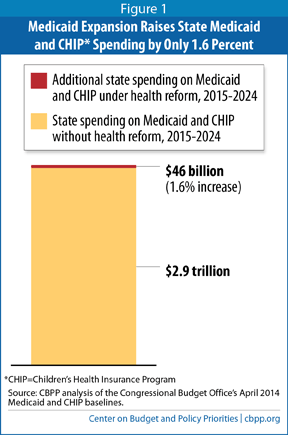One of the reasons that many states have argued that they should refuse the Medicaid expansion is because they fear the “woodwork” effect. People who were previously eligible for Medicaid, and now want it, aren’t covered 100% by the federal government like those who are newly eligible. States have to pay for 25% – 50% of their Medicaid costs, which could get expensive.
Of course, they could be on the hook for these payments even if they didn’t expand Medicaid, but most have ignored that point.
Regardless, the CBO, in its latest revision, argued that fewer people are coming out of the woodwork than expected. This means that the projected state share of the Medicaid expansion is even lower than previously thought. Here’s a nice chart from the CBBP:
That’s not even the whole story:
CBO’s estimate of the impact of the Medicaid expansion and other health reform coverage provisions on state budgets is, as noted above, only a partial estimate — because it only reflects the impact on state expenditures for Medicaid and CHIP. The CBO estimate does not reflect the substantial savings that states and localities taking the expansion will realize from no longer having to bear the costs for various health services they were providing to large numbers of people who were previously uninsured but now have Medicaid coverage. The Urban Institute has estimated that if all states took the Medicaid expansion, states would save between $26 billion and $52 billion in this area from 2014 through 2019, while the Lewin Group has projected state and local savings of $101 billion.
Plus, you know, millions of people will get health insurance. I’m just saying.

